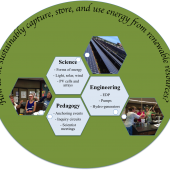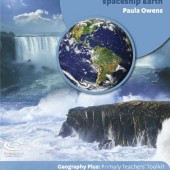
In August 2014, twenty-nine K-8 teachers from eleven Vermont schools engaged in the science, engineering and pedagogical practices of sustainable energy education. This week long workshop was organized by the Vermont Science Initiative (VSI), with an engineering and science instructor each from Norwich University and Lyndon State College respectively, and in partnership with the Vermont Energy Education Program (VEEP).
Teachers defined energy in terms of work, differentiated between transfers and transformations occurring across different energy forms, and gained a deeper conceptual understanding of renewable and nonrenewable energy sources. Opportunities for inquiry ranged from wind turbines, to electrical circuits, to light and Photovoltaic (PV) cells, and an energy bike. These, in combination with scientist meetings and a field trip to a nearby solar PV farm solidified their scientific literacy in the sustainable energy context. The teachers were also led through the Engineering Design Process (EDP) including concepts of design criteria and constraints to learn about sustainably engineering the energy components of systems. Teachers worked in groups to build an Archimedes Screw pump and determined the efficiency of a micro-hydro-generator. By the end of the week, post assessment test results revealed that the teachers had a 37% improvement in understanding various content areas.
By engaging elementary and middle school teachers in fun, hands-on exploration of sustainable energy we hope to bring this form of literacy to our youngest citizens, and future leaders and decision makers. The opportunity to continue engagement throughout the year with three follow-up sessions, and a forum to share the units they developed and best practices through the VT Agency of Education website will serve as a model for other stakeholders interested in implementing a similar program.
Continue Reading
In this succinct and informative review, Shelby Gull Laird provides a good overview and solid recommendation for the comprehensive package of sustainability education K-12 curricular materials about geography—from a local to a global level—available from the UK Geography Association.
Continue Reading